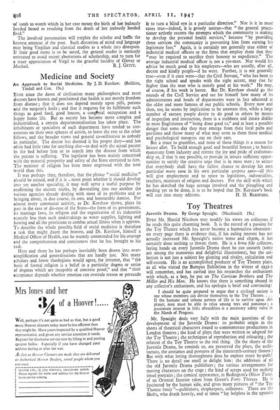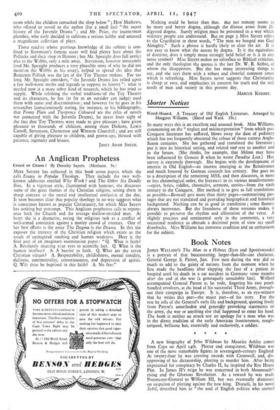Toy Theatres
Juvenile Drama. By George Speaight. (Macdonald. 15s.) EVEN Mr. Harold Nicolson may modify his views on collectors if he reads this quite charming book. It is the record of a passion for the Toy Theatre which has never become a humourless obsession: on every page there is evidence that, if his ruling interest has not actually increased Mr. Speaighes native sense and charm, it has certainly done nothing to thwart them. He is a bona fie collector, laying hands on every juvenile Drama sheet he can unearth (some are among the numerous and delightful illustrations), but the col- lection is not just a subject for gloating and rivalry, calculation and self-esteem. He is an accomplished producer of Toy Theatre plays, as all who visited the Bumpus Exhibition in the winter of 1932-3 will remember, and has carried into his .researches the enthusiasm with which, as a boy, he put on The Corsican Brothers and The Miller and His Men. He knows that there is something absurd in any collector's enthusiasm, and his apologia is brief and convincing: I should be quite prepared to argue that a civilised society is
one whose members can devote themselves to the Toy Theatre. . . .
If the humane and urbane pattern of life is to survive upon this planet, men must be able to relax among toys and nonsense ; a
interest terest in little absurdities, is a necessary safety valve in
the March of Progress.
Mr. Speaight deals very fully with the main questions of the development of the juvenile Drama: its probable origin in the sheets of theatrical characters issued to commemorate productions in London theatres ; the kind of plays that were written or adapted for the Toy Theatre ; the techniques of reproduction and colouring ; the relation of the Toy Theatre to the real thing. (In the sheets of the Juvenile Drama, he reminds us, are preserved the plays, the archi- tecture, the costumes and postures of the nineteenth-century theatre.) But with what loving thoroughness does he explore every by-path! There is no detail too small to delight him: the addresses of all the old juvenile Drama publishers-; the various arrangements for moving characters on the stage ; the kind of scraps used for making tinsel portraits ; the comical appearance, in Redington's Oliver Twist, of an Oriental Interior taken from Green's Forty Thieves. He is fascinated by the human side, and gives many pictures of "the Toy Theatre fancy "—publishers, shopkeepers, collectors. There are the Skelts, who drank heavily, and at times "lay helpless in the upstairs
room while the children ransacked the shop below " ; Hevir' Mathews, Who offered to reveal to the author (for a small fee) "the secret history of the Juvenile Drama " ; and Mr. Prior, the journeyman plumber, who early decided to cultivate a serious hobby and amassed a magnificent collection of plays.
Those readers whose previous knowledge of the subject is con- fined to Stevenson's famous essay will find plenty here about the Pollocks and their shop in Hoxton ; but Mr. Speaight does full justice also to the Webbs, only a mile away. Stevenson, however innocently (and Mr. Speaight produces a very plausible story of why he did not mention the Webbs in his essay), helped to spread the idea that Benjamin Pollock was the last of the Toy Theatre makers. For too long, Mr. Speaight considers, "the Juvenile Drama has relied upon a few well-worn myths and legends to support its history ": what is needed now is a more sober kind of research, which he has tried to supply. While relishing the verbal traditions4of the Toy- Theatre and its characters, he has (as far as an outsider can judge) used them with sense and discrimination ; and however far he goes in his researches (conscientiously noting, for instance, in his bibliography, that Penny Plain and Twopence Coloured are the titles of novels not connected with the Juvenile Drama), he never loses sight of the fact that Toy Theatres were made to give pleasure ; have given pleasure to thousands of children, among them Dickens, Lewis Carroll, Stevenson, Chesterton and Winston Churchill ; and are still capable of giving pleasure to children, and grown-ups, blessed with patience, ingenuity and leisure.
JANET ADAM SMITH.



































 Previous page
Previous page